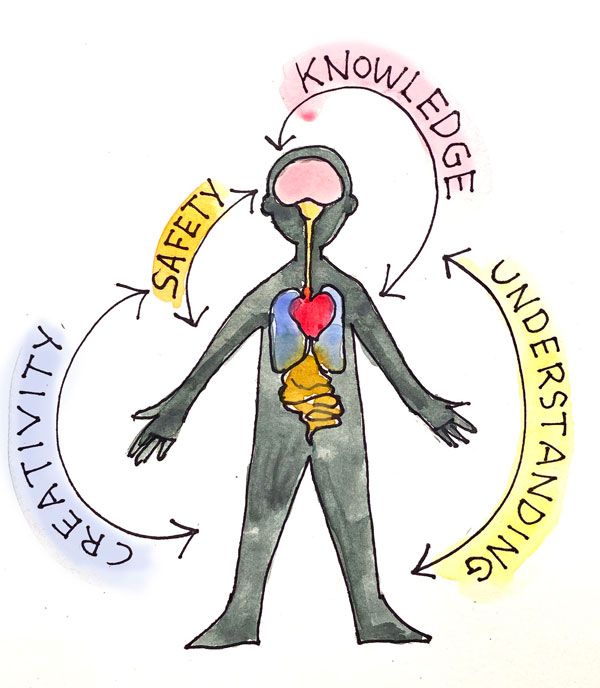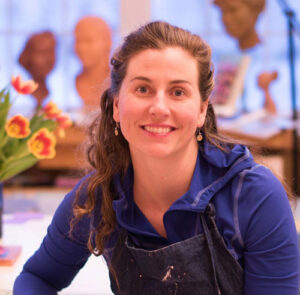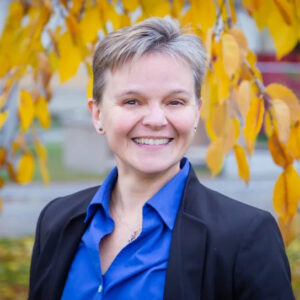
We are more than floating heads
As members of the Trauma-Informed Pedagogies faculty learning community (FLC), we (an artist and a linguist) were inspired to have conversations on what we have been discovering about the teaching/learning process in our respective disciplines. What emerged was our shared view that teaching and learning are holistic and embodied processes that incorporate not just cognitive processes, but also emotional and physical aspects. We have been learning through the Trauma-Informed Pedagogies FLC that many of our students may be processing trauma, anxiety and depression, which can manifest in the physical body and in behavior, and thus impact learning.
We acknowledge that our students may not automatically feel safe in an academic environment. But how can we notice this, and how can we make our courses a safe and supportive space for all students? This feels more challenging than ever when teaching outside of the physical classroom. Below, we share some of our observations on how trauma might manifest, as well as how we can use strategies of embodied and trauma-informed pedagogy to better support our students.

Noticing
We are starting to notice not just what our students say, but how they say it, how they hold their body, how they engage in learning. This can be challenging if we interact only with a disembodied face/voice on Zoom, or only through written communication in an asynchronous class, but even in these virtual environments we may see hunched shoulders, tense jaws or hear tense/uncertain voices. High cortisol levels of anxiety can bring students in a constant state of fight/flight or hypervigilance that can alter how they experience the world around them. Sometimes this manifests as hostility or perceiving criticism where there is none. Sometimes it can lead to inflexible, black-or-white thinking or being self-critical to the point of paralysis.
Creating Space
We are learning that while noticing is necessary and critical, we need to act to create a safe atmosphere that opens up space for the body throughout the learning experience. Simply acknowledging that we have bodies and making space for bodily needs such as breaks, food, movement and even laughter can go a long way to a more welcoming environment. In our online classes, we are foregrounding the physical, sensory and emotional aspects of our courses by talking about what things feel, smell or sound like. We are giving students opportunities to reflect on their learning experiences in low-stakes assignments, such as short private reflections or journals. This has made the learning process more visible to both the students and ourselves as instructors.
We also find it helpful to prepare students beforehand to expect and welcome challenges by explaining that developing a new skill can be frustrating, and that it is normal and expected to make mistakes throughout the process. Additionally, we are practicing to communicate calm and safety through the tone in our voice, or in our body language over Zoom or pre-recorded videos. In our written correspondence, where a stressed and anxious brain can easily misinterpret tone, we are choosing our words with great care to be clear, compassionate and encouraging. And, although we are implementing these strategies into our online classes, our growing awareness of trauma-informed approaches will allow our teaching practices to be even stronger when we return to the physical classroom.

Mareca Guthrie
ART Faculty
Mareca Guthrie is an associate professor of art in the UAF art department and the curator of fine arts at the UA Museum of the North. She holds a BA in Studio Art from Carleton College and an MFA in Film and Video Art from the California Institute of the Arts.

Wendy Martelle
Assistant Professor
Wendy Martelle is an assistant professor of applied linguistics and ESL in UAF’s English department and linguistics program. She holds a BA in International Studies and Russian from Dickinson College, an MA in Russian Philology from Moscow State University, and an MA and PhD in Applied Linguistics/Second Language Acquisition from the University of Pittsburgh



